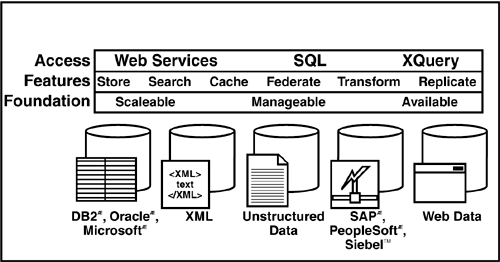5.2 Product and Technology Offering Summaries
This section provides brief summaries of current product and technology focus areas.
5.2.1 DB2 Universal Database
The DB2 Universal Database (DB2) family of products provides relational and object-relational data management support for XML applications. There are three specific areas of XML support. The first one is the DB2 XML Extender, an IBM object-relational "datablade" that provides access to, storage options, and transformation support for XML data through user-defined functions and stored procedures. DB2 Universal Database for Linux, UNIX, and Windows also provides extended SQL support that includes the creation of XML fragments from relational data through the use of a subset of SQL/XML valve functions. Additionally, Web service capabilities and support for extracting and using XML data in other products (such as WebSphere MQ) are provided.
5.2.2 Information Integration Technology
Information integration refers to the IBM technology infrastructure for integrating structured, semi-structured, and unstructured data. Xperanto is the code name for a project to address customer requirements for integrating diverse and distributed information. An online Xperanto project demo (http://xperanto.dfw.ibm.com/demo/) previews a number of the technology underpinnings.
Solving information integration challenges will require a combination of existing data management products/function and additional DB2 technology that supports operations on structured, unstructured, and semi-structured information. The Xperanto project will evolve these technologies to deliver a unified view across enterprise information and allow it to be searched, cached, replicated, transformed, and analyzed to meet the needs of the business. The intent is shown in Figure 5.1.
Figure 5.1. Xperanto Project

A focus for information integration is XML support, but it is more than that. It is a "home" for federation and distributed query application technology built for business integration and information integration requirements. From a product perspective, information integration offerings will have DB2 capabilities, additional federated source support, strong XML function, and support for structured and unstructured data.
| Top |







